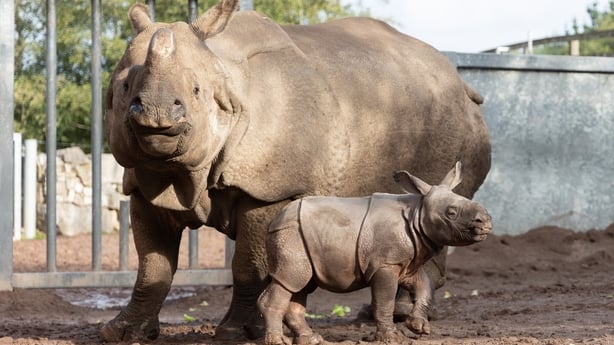The first baby Indian rhino to be born in this country was born last month at Fota Wildlife Park in Co Cork.
The as yet unnamed male calf arrived on 19 September after a gestation period of 16 months, to mother Maya and father, Jamil.
Both mother and calf are doing well, according to Fota Wildlife Park Lead Ranger Aidan Rafferty, who says they hope the calf will be the first of many to come.
"Maya is very protective and is constantly by his side," Mr Rafferty said.
"We're delighted to see the little calf running around and playing. He is an absolutely gorgeous animal, and he's getting stronger and more curious every day."
The calf is the second of only three Indian rhino calves born in any zoo this year.
The one-horned Indian rhino, once widespread thoughout parts of Asia, suffered population decimation due to hunting and poaching and was close to extinction at the start of the 20th Century.
It is listed as vulnerable by the International Union for Conservation of Nature with some 3,300 living in the wild.
"At the moment, he's not on view very often to the public as he's inside the rhino house with his mother and is gradually getting accustomed to going outside for brief periods," Mr Rafferty said.
"The best opportunity to see him is later in the afternoon. As he gets older and stronger, he'll be introduced to the remainder of the rhino habitat, which features grass meadows, mud pools and a lake area."

Mother Maya was born in Rotterdam Zoo and is almost ten years old.
She came to Fota in early 2020 as part of the European Endangered Breeding Programme from the Botanical Garden Branfér, in Nantes.
His father Jamil, who is nine, came to Fota in June 2015 from the UK.
Speaking to RTÉ's News at One, Director of Fota Wildlife Park Sean McKeown said: "It's very significant for us. It's a first for us, but also a first in Ireland.
"In the wild, there's only about 3,300 left in the wild in India.
"The actual mating occurred towards the end of lockdown in 2021, so you could almost call it a Covid baby.
"It's a long period of waiting to see if the animal is pregnant."
The public is now being invited to name the newborn.
Rhinoceroses are the largest land mammals after the elephant and are made up of five species, two African and three Asian.
With its highly distinctive armour-like skin, the Indian rhino is distinguished from its African counterparts, by its single horn.







